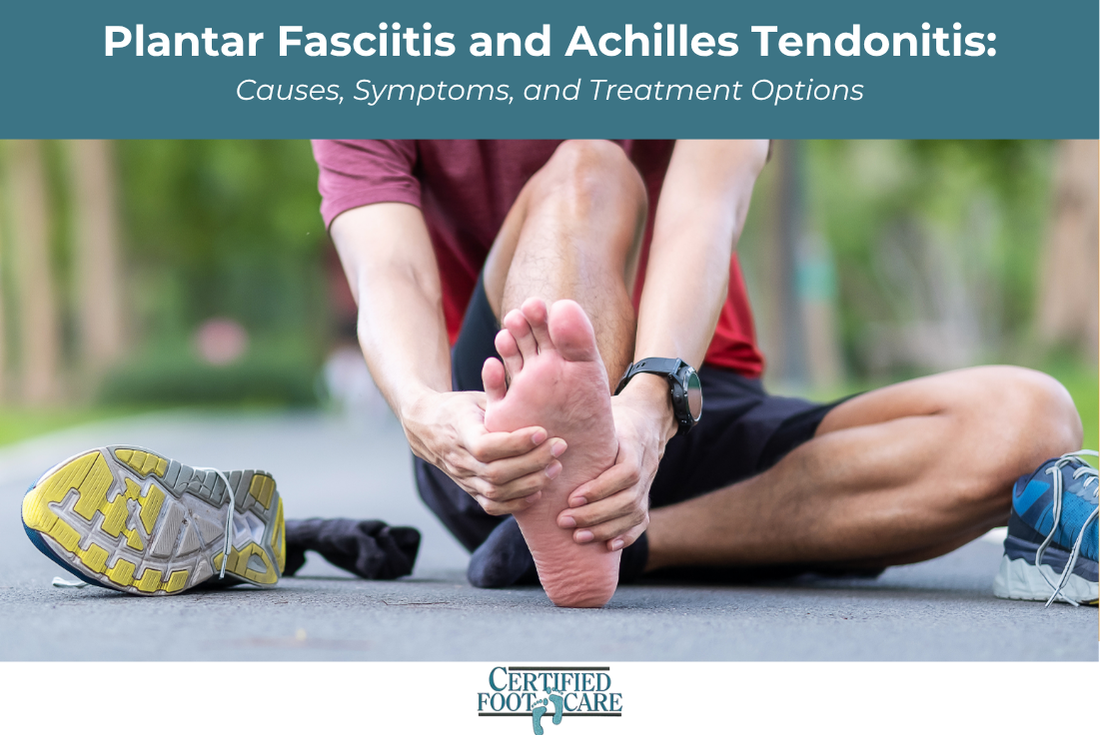 Brought to you by Certified Foot Care | Larchmont & Brooklyn, NY
Brought to you by Certified Foot Care | Larchmont & Brooklyn, NY
At Certified Foot Care, we specialize in diagnosing and treating some of the most common and painful foot conditions—Plantar Fasciitis and Achilles Tendonitis. These two ailments often cause heel and lower leg pain, particularly in active individuals and those on their feet all day. If you’re dealing with persistent heel pain or tightness in the back of your leg, you may be experiencing one of these conditions.
What is Plantar Fasciitis?
Plantar fasciitis is an inflammation of the plantar fascia—a thick band of tissue that runs across the bottom of your foot, connecting your heel bone to your toes. This tissue helps absorb shock and supports the arch of your foot. Repeated stress or strain can cause tiny tears in the fascia, leading to irritation or inflammation.
Common symptoms of plantar fasciitis include:
- Sharp heel pain, especially with the first steps in the morning
- Pain after long periods of standing or sitting
- Pain that worsens after exercise (not during)
What is Achilles Tendonitis?
Achilles tendonitis affects the Achilles tendon, the band of tissue that connects your calf muscles to your heel bone. This tendon is essential for walking, running, and jumping. Overuse or sudden increases in physical activity can cause the tendon to become inflamed.
Common symptoms of Achilles tendonitis include:
- Pain and stiffness along the Achilles tendon, particularly in the morning
- Swelling or thickening of the tendon
- Discomfort that worsens with activity
- Limited range of motion in the ankle
Causes and Risk Factors
Both conditions are commonly caused by:
- Overuse or repetitive strain from activities such as running, dancing, or prolonged standing
- Improper footwear, especially shoes lacking arch support or cushioning
- Tight calf muscles or Achilles tendon, which increases stress on the plantar fascia
- Flat feet or high arches, affecting how weight is distributed across the foot
- Sudden increase in physical activity, without proper warm-up or conditioning
Diagnosis and Evaluation
At Certified Foot Care, our foot specialists conduct a thorough evaluation that may include:
- A review of your medical history and symptoms
- Physical examination of the foot, heel, and ankle
- Gait analysis
- Diagnostic imaging, such as X-rays or ultrasound, to rule out other causes like stress fractures or bone spurs
Treatment Options at Certified Foot Care
We believe in a conservative, step-by-step approach whenever possible. Common treatments for both plantar fasciitis and Achilles tendonitis include:
Non-Surgical Treatments
- Custom Orthotics: To correct biomechanical issues and provide arch support
- Physical Therapy: Stretching and strengthening exercises to reduce strain
- Shockwave Therapy: Non-invasive acoustic therapy to stimulate healing
- Laser Therapy: Reduces inflammation and pain at a cellular level
- Night Splints: Keeps the foot in a stretched position overnight
- Anti-inflammatory Medications: NSAIDs to reduce pain and swelling
- Corticosteroid Injections (when appropriate)
Advanced Therapies
- Platelet-Rich Plasma (PRP) Injections: Uses your own blood components to stimulate healing in chronic cases
- Minimally Invasive Procedures: When conservative treatments fail, our specialists offer minimally invasive surgical options for both plantar fascia release and Achilles tendon repair
Prevention Tips
Preventative care can make a significant difference:
- Stretch your calves and plantar fascia daily
- Wear supportive footwear—even at home
- Replace athletic shoes regularly
- Gradually increase activity levels
- Avoid running on hard or uneven surfaces
FAQ: Plantar Fasciitis & Achilles Tendonitis
Q: Can I have both plantar fasciitis and Achilles tendonitis at the same time?
A: Yes, it’s possible. Both conditions are often linked to overuse and poor biomechanics. Our specialists can assess and treat both simultaneously.
Q: How long does it take to recover from plantar fasciitis or Achilles tendonitis?
A: Recovery time varies. With early and consistent treatment, many patients improve within 6 to 12 weeks. Chronic cases may take longer or require advanced interventions.
Q: Should I stop exercising if I have heel pain?
A: You may need to modify your activity, but total rest isn’t always necessary. Low-impact exercises like swimming or cycling can help maintain fitness while you heal.
Q: When should I see a podiatrist?
A: If you experience heel or tendon pain that lasts more than a week or worsens over time, it’s time to see a specialist.
Q: Do over-the-counter orthotics help?
A: They can provide temporary relief, but custom orthotics are designed to correct your unique foot structure and are often more effective long-term.
Why Choose Certified Foot Care?
With offices in Larchmont and Brooklyn, Certified Foot Care provides individualized, state-of-the-art treatment for foot and ankle conditions. Our podiatrists are dedicated to helping you return to an active, pain-free lifestyle through compassionate, expert care.
Contact Us Today
Certified Foot Care
🌐 certifiedfootcare.net
📍 Larchmont Office
2365 Boston Post Road Suite 200
Larchmont, NY 10538
📞 (914) 834-0111
📍 Brooklyn Office
474 Bay Ridge Pkwy
Brooklyn, NY 11209
📞 (917) 965-4800
If heel or tendon pain is slowing you down, don’t wait. Schedule an appointment today and let Certified Foot Care help you get back on your feet.
